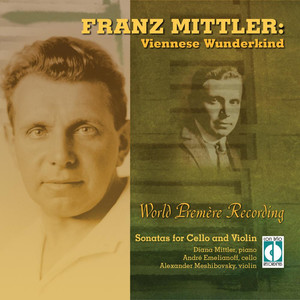
Franz Mittler: Viennese Wunderkind
- 流派:Classical 古典
- 语种:英语
- 发行时间:2010-08-02
- 类型:录音室专辑
- 歌曲
- 时长
-
Sonata in G for Cello
-
Sonata in D for Violin
简介
Franz Mittler (1893-1970) was born in Vienna on April 14,1893. Displaying talent as a violinist at an early age, he first performed in concert at the age of nine accompanied by the seven year old pianist, Clara Haskil. By 1904, he was concentrating on the piano, studying with Theodor Leschetizsky; his cousin, Leonie Gombrich, mother of the renowned art historian, Sir Ernst Gombrich, who was Leschetizsky’s assistant, and later with Carl Friedberg. He also studied composition with Richard Heuberger, an associate of Brahms, and Karl Prohaska, and theory with the noted contrapuntist, Joseph Labor. In 1919, after serving in the Austrian Army during World War I, Franz Mittler was appointed conductor at the Opera Theater in Gera-Reuss, Germany where his ballet, “The Golden Goose” was performed. During the 1920’s and 1930’s, he returned to Vienna as a leading “lieder” accompanist, touring with Franz Steiner, and Leo Slezak and serving as musical collaborator with the famed satirist, Karl Kraus, in his revival of Offenbach operettas. In 1938, Mittler emigrated to America where he became a pianist-arranger for the First Piano Quartet, well-known to radio, record, television, and concert audiences of the 1940’s and 1950’s. He also made many educational arrangements and composed original teaching pieces for Musicord Publications. From 1965 to 1967 he served as a vocal coach at the International Summer Academy of the Mozarteum in Salzburg which honored him with a Memorial Concert in 1995. He passed away in Bavaria in December,1970. Mittler’s compositions include more than 65 songs and many chamber works, piano pieces, choral compositions, and the opera, “Raffaela”. His musical works have been published by Simrock, Universal Edition, Doblinger, Bongiovanni, Theodore Presser, and Associated Music. He also gained international fame as a published and recorded master writer of very humorous and ingenious spoonerisms and limericks in German and English. A partial listing of his works can be found in his biography titled, “Franz Mittler: Austro-American Composer, Musician, and Humorous Poet” written by his daughter, Diana Mittler-Battipaglia, which was released in 1994 by Peter Lang Publishing as part of its Modern Austrian Culture Series (ISBN 0-8204-2063-8). A collection of 400 of his compositions including the Violin Sonata in D major, composed in 1909, and two early piano trios was discovered by his daughter in the Austrian National Library in Vienna in June 2000, expanding the archive sent by to her by the Mozarteum in 1974. Unfortunately a number of major compositions by Franz Mittler including a violin and a cello concerto were lost during the Nazi annexation of Austria while he was on a concert tour in Holland. Because of his association with Karl Kraus and his Jewish ancestry, he couldn’t return to Vienna and only a portion of his music could be sent to him after he emigrated to America in December 1938. The professional debut of Mittler as a composer was auspicious. His ”First String Quartet in F Major” (1909) was premiered by the Prill Quartet in 1910. Richard Specht, a close associate of Brahms, writing in “Die Musik” noted, “Two quartets…and one that points to future personal recognition. Beautifully realized, full of warmth and sensitive expression was the premiere work of this still very young composer (sixteen years old) of such unquestionable talent.” The Sonata in G Major for Cello and Piano was composed in 1910 and performed on tour by Paul Grümmer, solo cellist of the Vienna Konzertverein and later the Busch Quartet, with Mittler at the piano. The first performance took place in Berlin. Emil Thilo, writing in the November 1911 issue of “Die Musik” said, “It contains good music in solid construction”. Even greater acclaim followed in 1911 when Universal Edition published two opuses of his songs and N. Simrock in Berlin published his “Trio in G Major Opus 3, for Violin, Cello, and Piano” A review in the September 1912 edition in “Die Musik” by Hugo Schlemüller states,“ A strong talent for melody, a genuine joy in making music seems to speak to me from this very effective trio… …It is beautifully developed, free from prolixity…” During the past decade, Mittler’s songs have been recorded by the renowned Austrian baritone, Wolfgang Holzmair, and soprano, Judith Kopecky; his piano trio by the Con Brio Ensemble; and his string quartets by the noted Viennese ensembles, the Hugo Wolf Quartett and the Artis Quartett, and released by Preiser, Extraplatte, and CPO Records. Recently a number of his chamber works have been reprinted or published for the first time by Edition Silvertrust. It is hoped that these two youthful sonatas will provide a further glimpse into late Romantic Viennese compositions which were eclipsed after World War I by revolutionary atonal and ethnic styles and have only in recent years been rediscovered and appreciated. —program notes by Diana Mittler-Battipaglia

